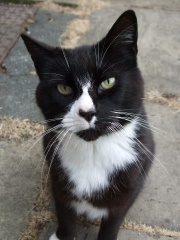Dealing with Panic Attacks if they happen
It is possible to prevent panic attacks from happening, once you have learned to keep your level of anxiety under control. However, while you are developing this skill, it is possible that you might experience further panic attacks. What should you do if this happens?
 I use the "ABCDE" mnemonic to help clients remember what to do.
I use the "ABCDE" mnemonic to help clients remember what to do.
A - Assure yourself that you will be A-okay
Remember that panic attacks are certainly unpleasant but they will not kill you and nor will they cause you any serious damage. You might feel very unwell but you will not become unwell. Simply remembering this can reduce the scale of the terror -- it is an unpleasant thing but it won't last for more than a few minutes – 20 at the very most -- and it won't do you any permanent harm. No one has ever died as a result of a panic attack!
ABCDE will help you remember what to do in the event of a panic attack
B - Breathe slowly and deeply
When you become anxious, you start to breathe more rapidly and also more shallowly. Unfortunately, this can make you feel lightheaded or dizzy. This increases your anxiety. In some cases you might "hyperventilate". This means you have too much oxygen but paradoxically, you can feel like you are suffocating. This is because you have too little carbon dioxide (CO2) and it is this CO2 which regulates your breathing and makes for the efficient extraction of oxygen from the air. This is why some people advise you to breathe from a paper bag; the build-up of CO2 as you re-breathe the air from the bag rebalances things. There's certainly no harm in trying this but breathing slowly and deeply, ensuring you are moving your abdomen as well as your chest, is just as effective and somewhat less conspicuous! For more detail on breathing techniques, see Relaxation Techniques.
C - Challenge your irrational thoughts
During periods of intense anxiety, the civilised, developed and rational part of your brain hands over control to the more emotional and primitive part of your brain. Remember, the "fight or flight" response is a primitive response designed to deal with physical threat. Unfortunately, this means you will start to think like a hunted animal, behaving more like your cat or your dog in a crisis then the sensible rational human being that you are.
At this point, you are living in the emergency world of extremes; everything is terrible, you are “losing it” completely, you think that everyone is looking at you or judging you. When you think like this, you convince yourself that the muscular tension in your chest is a heart attack and that slight tingle is the onset of a stroke.
Your instincts are negative, suspicious and aggressive -- this is designed to help you survive in a savage situation but you live in the 21st century, not on the savannah 100,000 years ago. (See also "The story of Ug the prehistoric cave boy")
So start to think like a human being and not like my cat, who threw himself mindlessly at a glass door that he had lived with for 10 years, attempting to escape when panicked by some men who came to deliver a sofa! (He was fine by the way but he had a sore head the next day!)

Mr C: "You wouldn't think that a bruiser like me would panic, but I did. Glass door? What glass door?"
One way to regain control is to challenge what you are thinking using an evidence-based approach. For example, if you are thinking "I won't survive this", remind yourself that you have survived previous attacks -- where is the evidence to say that this should be any different? Or if you think that everyone is looking at you, compare the way people are looking at you with the way they are looking at others.
D - Distract
Your consciousness consists of that which you choose to focus on. You cannot be aware of everything around you at once. In a panic, you tend to focus on, or become fixated with, thoughts about the panic. (That's because nature wants you to focus on the threat to your existence, rather than lose interest in it!)
 Do you see the drinking chalice or two faces? It is possible to see either one or the other but not both at the same time, demonstrating that we choose where we focus our attention
Do you see the drinking chalice or two faces? It is possible to see either one or the other but not both at the same time, demonstrating that we choose where we focus our attention
If you consciously and deliberately shift your thoughts to something else, you will necessarily need to let go of this focus on the panic. At the first signs of concern, make a conscious effort to distract yourself by focusing on something else; tackle a puzzle or problem, imagine that you need to make a report about something happening outside through the window. At a pinch, even counting the hairs on the back of your hand will serve as a distraction!
 E - Enjoy!
E - Enjoy!
Once you have used these techniques to successfully stave off an attack, you have taken the first steps to freeing yourself of panic for good. It is important to enjoy this feeling of success, noticing your confidence, anchoring this in your mind, because next time it will be easier than it was this time!
